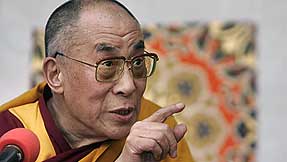Buddhist Monks: End Dalai Lama's Exile
By AUDRA ANG, AP, April 9, 2008
LUQU, China -- More than a dozen Buddhist monks staged an emotional protest Wednesday in front of visiting journalists at a monastery in western China to call for the return of exiled Tibetan leader the Dalai Lama, according to a reporter at the event.
 The monks, whose numbers grew to about two dozen during the 10-minute incident, began shouting slogans in Tibetan in an outer courtyard as journalists entered a prayer hall at the Labrang monastery in western Gansu province bordering Tibet.
The monks, whose numbers grew to about two dozen during the 10-minute incident, began shouting slogans in Tibetan in an outer courtyard as journalists entered a prayer hall at the Labrang monastery in western Gansu province bordering Tibet.
"We want human rights, we want the Dalai Lama back, we want to preserve our religion and culture," said one monk, who switched to Chinese when asked by a reporter from the American Broadcasting Corporation.
The incident followed a similar interruption during a closely scripted government media tour of Tibet's capital of Lhasa two weeks ago to view damage from anti-government riots that erupted there last month.
Authorities have tightly restricted access to Tibet and Tibetan areas of western China where protests also broke out. The sometimes violent anti-government demonstrations were the largest and most sustained among Tibetans in almost two decades.
ABC reporter Chito Romana said the monks also displayed the snow lion pennant of independent Tibet, labeled a "reactionary flag" by China's communist regime.
Romana said Chinese Foreign Ministry handlers observed the protest but did not attempt to block the monks. The group walked away after senior monks appeared and calmed them down, he said.
Shortly afterward, a senior monk told reporters the protesters represented only a few of those at Labrang. He said they would not be punished by monastery authorities, but could face sanctions if authorities find that they broke the law, Romana said.
China's official Xinhua News Agency reported only that a group of monks had interrupted the event, and said the visit resumed soon afterward. The Associated Press was not invited on the government-arranged trip.
Just south of Labrang, armed police manned a roadblock leading from the town of Luqu toward the monastery of Xicang, some of whose monks are believed to have taken part in protests in mid-March.
The glass front of the town's police headquarters was riddled with holes from stones and other objects hurled by rioters. Notices on the walls urged participants in the protest to surrender to authorities while unarmed paramilitary police marched down the street and stood guard outside government buildings.
The latest protest came as Tibet's governor said he was prepared for Tibet independence activists to cause "trouble" for the Olympic torch relay when it passes through the Himalayan region on its way to Mount Everest next month.
Champa Phuntsok, the Chinese-appointed head of the Tibetan Autonomous Region, said he believes supporters of the Dalai Lama, blamed by Beijing for instigating last month's unrest, will try to use the historic event to publicize their cause.
"For these separatist forces, the Olympics in Beijing will be a rare opportunity," he told a news conference in Beijing. "Therefore they wish to create major troubles or incidents. I don't doubt they will create trouble during the torch relay in Tibet."
Thousands of raucous protesters angry about China's policies in Tibet and its human rights record have already disrupted the torch relay's round-the-world tour at stops in London and Paris.
Heavy security has been deployed in San Francisco, where the torch arrives Wednesday, after protesters there climbed the Golden Gate Bridge to hang the Tibetan flag earlier this week.
Champa Phuntsok said special security preparations had been made for the Tibet relay leg to ensure it would be "completely successful and safe."
"During the torch relay in Tibet and in climbing Mount Everest, if anyone should attempt to disrupt or undermine the torch relay, then they will be dealt with severely according to the law," he said.
The torch relay, the longest in Olympic history, was aimed at showcasing China's rising economic and political power. Instead, Chinese leaders have come under increasing international criticism following its crackdown in March on massive anti-government demonstrations in Lhasa.
China has said that 22 people died in the violence while Tibetan exile groups have said at least 140 were killed.
Foreign journalists, including an Associated Press reporter, were present at Lhasa's Jokhang temple, one of the holiest shrines in Tibet, when a group of monks interrupted a government media tour on March 27 with an emotional outburst.
Those monks had complained about the lack of religious freedom and called for the return of the Dalai Lama, a Nobel Peace prize winner.
Champa Phuntsok on Wednesday said those monks had not been punished for speaking out.
"We simply do not punish or execute monks for telling a different version. Of course, their version is untrue," he said.

 The monks, whose numbers grew to about two dozen during the 10-minute incident, began shouting slogans in Tibetan in an outer courtyard as journalists entered a prayer hall at the Labrang monastery in western Gansu province bordering Tibet.
The monks, whose numbers grew to about two dozen during the 10-minute incident, began shouting slogans in Tibetan in an outer courtyard as journalists entered a prayer hall at the Labrang monastery in western Gansu province bordering Tibet.